
Articles by Togo

IPPF is awarded USAID-funded ExpandPF
The International Planned Parenthood Federation (IPPF) is pleased to share that last month it was awarded the USAID-funded, five-year, $45 million Expand Family Planning and Sexual and Reproductive Health (ExpandPF) Activity following a competitive process. ExpandPF will scale up evidence-based family planning practices, including postpartum family planning and engaging community health workers, to improve access to and use of voluntary family planning services in poor and underserved urban and peri-urban populations. ExpandPF envisions a local-partner forward strategy and close engagement with young people for implementation in Cameroon, Cote d’Ivoire, Mauritania, and Togo. IPPF brings strong experience improving access to client-centered, quality family planning and sexual and reproductive health care services as allowed under USAID regulations and local law. Its structure is designed to advance locally led development, engaging women and youth while reaching underserved and marginalized communities. Hortense Angoran Benie, MD, MPH will lead ExpandPF and has significant management experience with complex public health programs across West and Central Africa. IPPF’s partners include Options Consultancy Services, Etrilabs, and IPPF member associations in each of the four implementing countries: Association Ivoirienne pour le Bien-Être Familial (AIBEF), Association Togolaise pour le Bien-Être Familial (ATBEF), Association Mauritanienne pour la Promotion de la Famille (AMPF), and Cameroon National Association for Family Welfare (CAMNAFAW). The team also includes Viamo as sub-contractor. Through ExpandPF, the consortium will ultimately assist individuals to make voluntary, informed decisions about family planning with access to contraceptive methods and services. “IPPF is very proud to receive the ExpandPF award,” said Dr. Alvaro Bermejo, IPPF Director General. “It affirms our commitment to West and Central Africa and expanding contraceptive choice to underserved and marginalized populations. IPPF believes that by working with our esteemed partners, we can advance meaningful progress across the region.” "ExpandPF aligns well with IPPF's strategy of prioritizing access to family planning and sexual and reproductive health services for vulnerable women and girls in West and Central Africa,” said Marie-Evelyne Petrus-Barry, IPPF Africa Regional Director. USAID administers the U.S. foreign assistance program providing economic and humanitarian assistance in more than 80 countries worldwide. The Agency is committed to helping countries meet the family planning and reproductive health needs of their people through voluntarism and informed choice.
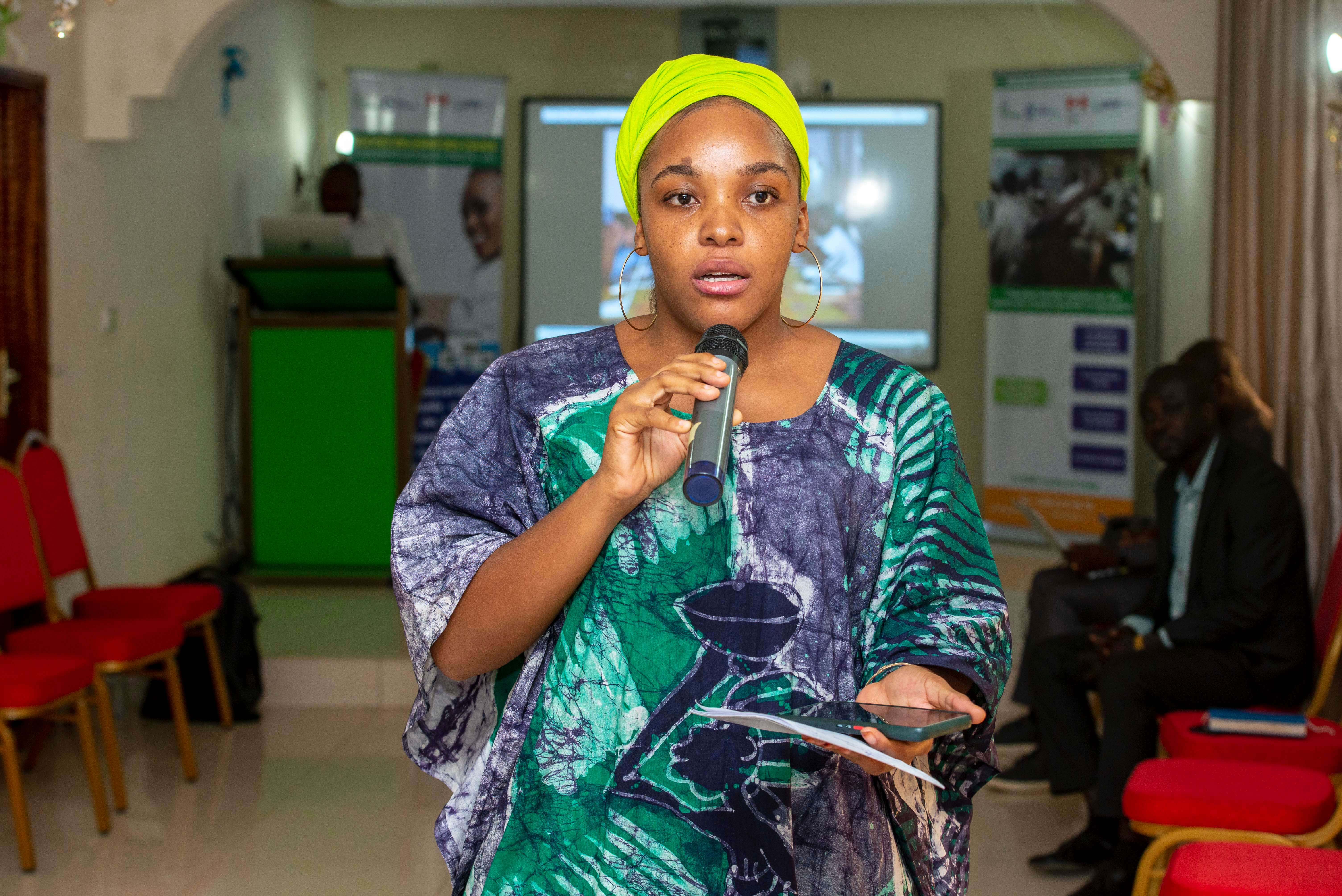
Volunteer becomes “lifelong activist in the name of sexual education” for Togo’s youth
Growing up in Sokodé, a city in central Togo, Hayathe Ayeva dreamed of a career as a health-care professional. She studied hard in school and saw similar drive and lots of potential in the girls around her. But by the age of 12, some of her friends were becoming sexually active. With no access to sexuality education teaching them about consent and bodily autonomy or birth control in the conservative community, the doors to whatever future they had hoped for quickly closed. “I really couldn’t stand to see my friends, who were brilliant at school and surely promised a bright future, suddenly drop out because of early marriage, pregnancy or gender-based violence,” Ayeva recalls. “This is something that saddened and revolted me because I believed that, together, we should go on to higher education and become financially independent. I decided to fully commit myself to the defence of human rights, especially reproductive-health rights.”

In pictures: Innovating during COVID-19
Women around the world have faced multiple barriers to accessing safe abortion care during the COVID-19 pandemic including the de-prioritization of sexual and reproductive healthcare, overwhelmed health systems and restrictions on movement. The COVID-19 crisis has sparked innovation among IPPF Member Associations who responded swiftly by developing new approaches to reach women with safe abortion care including telemedicine and home-based provision of medical abortion. Strong evidence generated from this work supports the continuation and strengthening of these approaches beyond the end of the pandemic. Cameroon Cameroon National Planning Association for Family Welfare (CAMNAFAW) To ensure that quality abortion care can be provided to women during travel restrictions, CAMNAFAW’s service providers travel to partner clinics in underserved areas and to clients’ homes to provide medical and surgical abortion care. This model of taking safe abortion care closer to women will continue even with easing of travel restrictions, as this has been found to be an effective and acceptable approach to increasing access.Photo: IPPF/Xaume Olleros/Cameroon Share on Twitter Share on Facebook Share via WhatsApp Share via Email Guinea Association Guinéenne pour le Bien-Etre Familial (AGBEF) Building on lessons learned during the Ebola crisis in Guinea, AGBEF quickly took measures to prevent infection in its clinics to continue providing sexual and reproductive healthcare, including surgical and medical abortion, in a safe environment. AGBEF donated protective materials to communities, including hand-washing stations, face masks and antibacterial gel, alongside messaging on infection prevention. This community visibility reassures clients they can safely attend AGBEF clinics for abortion and contraceptive care.Photo: AGBEF/Guinea Share on Twitter Share on Facebook Share via WhatsApp Share via Email India Family Planning Association of India (FPA India) FPA India and partners advocated to have sexual and reproductive healthcare, including abortion, recognized as essential by the government, which meant FPA India could continue healthcare delivery during the national lockdown. To reduce in-person clinic visits, FPA India established teleconsultation and counselling for abortion care, and is continuing to provide in-clinic care for both medical and surgical abortion. Photo: IPPF/Alison Joyce/India Share on Twitter Share on Facebook Share via WhatsApp Share via Email Nepal Family Planning Association of Nepal (FPAN) FPAN and partners advocated for interim approval of home provision of medical abortion and telemedicine for abortion counselling during COVID-19. FPAN is now implementing these approaches, ensuring continued access to abortion care in Nepal, where many people live in remote locations with limited mobility, which has been further restricted by COVID-19 lockdowns. Photo: FPAN/Nepal Share on Twitter Share on Facebook Share via WhatsApp Share via Email Pakistan Rahnuma – Family Planning Association of Pakistan (Rahnuma-FPAP) Rahnuma-FPAP and partners successfully advocated for the government to class sexual and reproductive healthcare as ‘essential’, which enabled the team to continue providing post-abortion care during the pandemic. Rahnuma-FPAP expanded its telemedicine and home-based provision for menstrual regulation counselling and post-abortion care. These new approaches have ensured continued access to services for clients unable to reach clinics.Photo: Rahnuma-FPAP/Pakistan Share on Twitter Share on Facebook Share via WhatsApp Share via Email Palestine Palestinian Family Planning and Protection Association (PFPPA) In response to the government-mandated closure of its clinics, PFPPA quickly established a toll-free call centre which provides consultations, counselling, referrals and follow-up, including consultation for abortion care through a harm reduction approach, ensuring that women are provided with accurate information. Due to its success, PFPPA is exploring options for continuing this healthcare delivery model beyond the pandemic, with the aim of keeping it free of charge for users.Photo: SAAF/Samar Hazboun/Palestine Share on Twitter Share on Facebook Share via WhatsApp Share via Email Sudan Sudan Family Planning Association (SFPA) Following a nation-wide shutdown in April, SFPA established a call centre to increase access to healthcare, including abortion and contraceptive counselling and referrals. An unexpected outcome of the new call centre is that it has reached an increased number of young women who regularly call to discuss their reproductive health and rights. SFPA is working towards institutionalizing this model for continuation beyond the pandemic.Photo: SFPA/Sudan Share on Twitter Share on Facebook Share via WhatsApp Share via Email Togo Association Togolaise pour le Bien-Etre Familial (ATBEF) ATBEF adapted its mobile application ‘Infos Ado Jeunes’, adding a toll-free teleconsultation service for young clients to use to access abortion consultations and pre- and post-abortion counselling. This app has given young clients ongoing access to care when they face challenges travelling to clinics. It has also eased overall client flow in clinics at a time when social distancing is being implemented.Photo: ATBEF/Togo Share on Twitter Share on Facebook Share via WhatsApp Share via Email
COVID-19 Impact: What we know so far – Togo
An interview with Joel Akolly Eklou, Director of Marketing, Communication and Resource Mobilisation at Association Togolaise pour le Bien-Être Familial (ATBEF), on the impact of COVID-19 in Togo. How has Togo been affected by the Coronavirus/COVID-19? The first case was announced in Togo on March 6th, 2020 so it's still pretty recent. Officially, Togo has 12 confirmed cases of COVID-19. The country is in panic. Schools, universities and learning centres have been closed since yesterday and the land borders are now closed too. People’s habits are now beginning to change. On an economic level, food prices at the market level have started to rise, which is a negative consequence. For the moment, the country is not under lockdown, but the government has prevention rules that everyone must respect. In the market, traders are wearing masks or covering their faces. There is a big awareness campaign and currently a crisis unit is being set up with a mechanism for managing proven cases and suspected cases. What impact is coronavirus having when it comes to sexual and reproductive health services? Because there is no national lockdown at the moment, there has not been a huge impact on these services at our points of delivery, but we all agree that this will become very difficult in the coming days. The most recent decisions taken by the government will tighten up restrictions on movement. It is certain that for family planning services, the reflex to use these services will diminish because the population is more concerned about survival. So, it will be relegated to the background, we believe. What services have been the worst hit so far?? I am sure that contraceptive services, which are not categorised as emergency services, will be strongly affected. I’m certain that reproductive health service provision will fall, but on our maternity and gynaecology wards, categorised as emergency services, we think that attendance will actually increase, because pregnant women sometimes also have breathing problems. Are frontline staff still able to go into the community? Our community-based programmes and mobile clinics are working as normal, but the frontline staff are of course respecting the prevention measures to the letter. When the decision on whether to work becomes more difficult, or if we go into lockdown, we will draw up a framework with the Department of Health to offer a minimum level of services. Our staff will also work with the government to raise awareness about complying with the rules on Coronavirus prevention. We are not quite at this stage yet though. What will you be doing to keep providing services to people in Togo? Our senior staff are currently formulating a contingency plan. We are almost sure that there will be a lockdown at some point, so we are working out how we can offer a minimum level of services despite that. We are working with key officials in the Department of Health to ensure that it is a realistic contingency plan, that we can use when things get difficult. We're also in contact with other IPPF Member Associations who are undergoing the same process, so that things are streamlined. We want a skeleton staff to have the materials and the strategies that will enable them to continue to offer services. We are an NGO that works alongside the state, so our service delivery points cannot be closed at a time when the state really needs us. We are humanitarians. We have to work with the government to really move forward with this contingency plan so that we can continue to provide services. What message do you have for people and your staff in Togo when it comes to sexual and reproductive health services and Coronavirus/COVID-19? ATBEF is relaying the prevention measures set out by the government systematically, through all staff at our points of service. That means washing hands with soap and water, refusing to shake hands, using hand sanitizer, and keeping a one-metre distance from others wherever possible. It’s hard to break habits, but we are making a huge effort. At the market, we need to cover our mouth and nose. We continue to offer reminders of appointments for contraception provision, and to chase them up, so that coronavirus does not get in the way of family planning. We are talking about the virus every single day but trying not to let sexual and reproductive health fall by the wayside. Every client who comes to our clinics must wash their hands and have their temperature taken. Our staff are fully integrated into this contingency plan, so that we can minimize the risk of COVID-19 spreading.
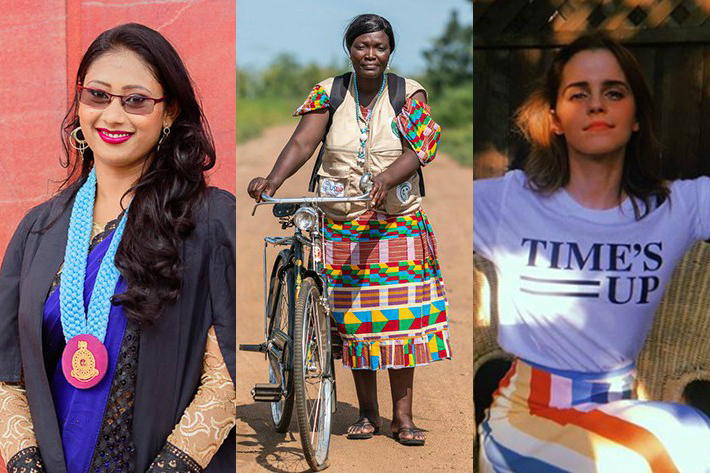
Celebrating passion and commitment this International Women’s Day
International Women's Day (8 March) is a time to celebrate the incredible achievements of fearless women around the world. Today (and every day) we’re honored to highlight the passion and continued commitment of doctors, nurses, peer educators, activists and volunteers who dedicate their efforts to advancing sexual and reproductive health and rights globally. These are just a few of them: Chathurika Jayalath, youth volunteer, Sri Lanka In May 2017, flash flooding in Sri Lanka triggered landslides resulting in many people losing their homes and forcing them to seek emergency shelter. 24-year-old student Chathurika, a youth volunteer for IPPF’s Member Association the Family Planning Association of Sri Lanka (FPASL), took part in the response. She helped in organizing the health camps, and she even runs a youth club at her university to inform her peers about sexual health. Find out more about Chathurika inspiring community contributions Emma Watson, actor & activist, UK For almost as long as she’s been in the spotlight, actor Emma Watson has been well known for her feminist activism. Over the years she has lent her support to many vital issues including ending child marriage, violence against women and female genital mutilation, as well as fighting for abortion care and LGBTQI rights. She’s also a partner to IPPF! Keep up with Emma’s important work by following her on Twitter now Vicky Acora, volunteer, Uganda Vicky is a married mother-of-two. She faces all the usual challenges that women face when it comes to getting sexual and reproductive health services - but Vicky’s life is complicated further because she is deaf. In the past, she would have trouble communicating with health staff who did not understand her needs, but since seeking services at Reproductive Health Uganda’s clinic in Gulu (a Member Association of IPPF), she has been able to get the healthcare she needs. She has since then even been advising other deaf people to seek services with the clinic. Read more about Vicky’s experience Dr Leana Wen, president of PPFA, USA IPPF was thrilled when Dr Leana Wen was appointed as President of Planned Parenthood Federation of America last year. She is a dynamic public health leader, a practising physician and not least, a formidable woman. Since she started her demanding role, she has helped Planned Parenthood continue to provide high-quality care to the people who need it across the United States, and she is a powerful voice in our fight to ensure that women have the ability to make their own healthcare decisions. We look forward to seeing what she will achieve next. If you do too, then follow Dr Wen on Twitter Abla Abassa, health worker, Togo Abla is a community health worker. She spends her days cycling around her home village’s dusty streets in rural Togo visiting households who have signed up to an innovative programme that provides contraception in hard-to-reach places. She might visit as many as five households in one day, where she’ll discuss and provide family options including the Pill, condoms and injection, with people who might otherwise not know what their choices are. Find out more about what her vital job entails
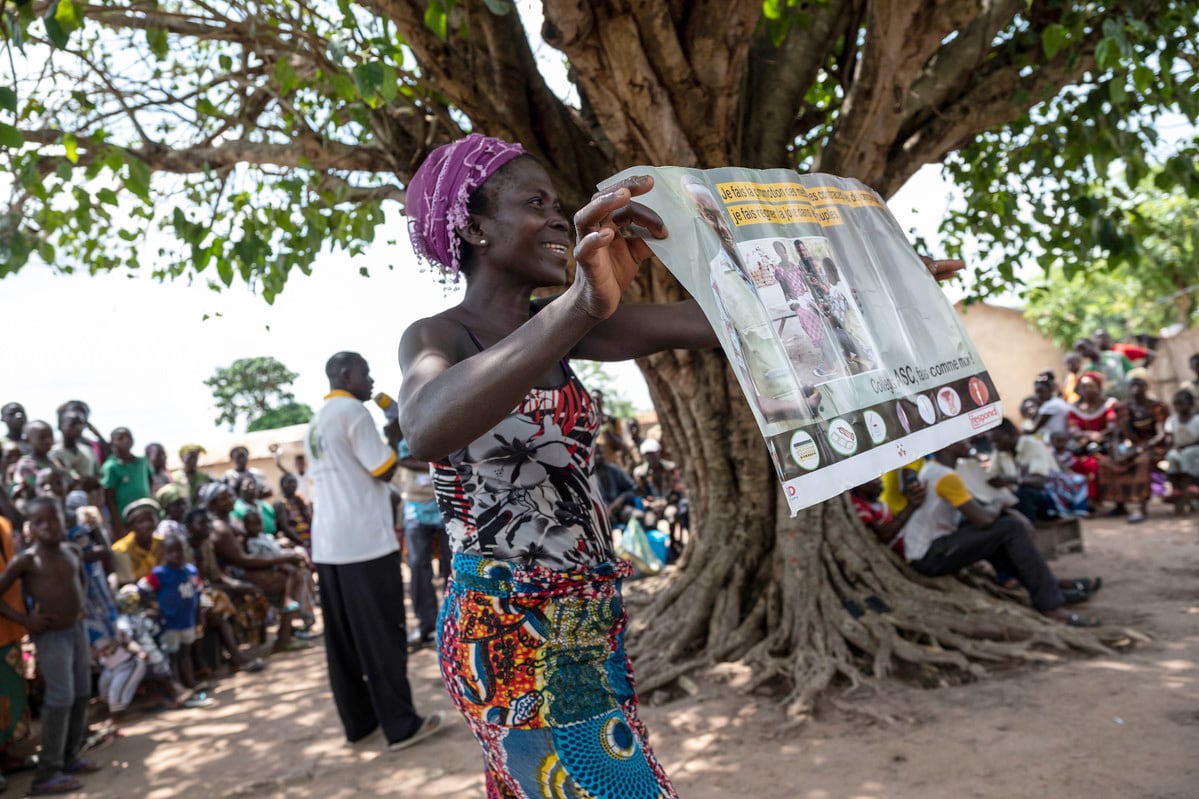
In pictures: Togo and the rise in contraception use
Félicité Sonhaye ATBEF Regional Coordinator The Association Togolaise pour le Bien-Être Familial (ATBEF), has led a pioneering programme training community health workers to administer contraception in the rural areas where they live. “The injection is used more than any other method. Around 60% of women use it,” said Félicité Sonhaye, ATBEF Regional Coordinator for Togo’s Plateaux region, which covers Ilama. “Women appreciate the reliability and long-lasting effects of the injection, which allow them to stop worrying about unexpected pregnancies”, Sonhaye added. Share on Twitter Share on Facebook Share via WhatsApp Share via Email Sossou Sagna Ilama village chief Men like Sossou Sagna, have great influence and respect within Togo’s rural communities. As Ilama’s village chief his approval was required for the ATBEF community project to take root. “I sent my own wife to seek family planning. The lady helped us and it worked really well. I also went with my older brother’s wife and she was very satisfied. Every member of this community is now aware that having a large family drives them towards poverty. Ignorance was the reason why we had so many children per family here before. Now with the family planning advice we have received, spacing births has become a reality and the reduction of the number of children per family.” Share on Twitter Share on Facebook Share via WhatsApp Share via Email Abla Abassa Community health worker Abla is a community health worker, and spends her days cycling around Ilama’s dusty streets visiting households that have signed up to an innovative programme providing contraception in hard-to-reach places. “Before, people didn’t have a lot of information about contraception. With the project the community is now able to space their births. I have seen the number of children per family going down. That’s contraception but also the increasing cost of living, and the fact that everyone wants to send their children to school.” Share on Twitter Share on Facebook Share via WhatsApp Share via Email Essivi Koutchona Client Facing prohibitive costs of school fees and food prices for six children, Essivi Koutchona, began using the contraceptive injection after deciding with her husband they did not want another child. She has received the injection every three months and has not experienced any side effects. “The community health worker passed by our house one day and explained the method and a bit about the possible side effects. We agreed as a couple that we wanted me to start using the injection.” Share on Twitter Share on Facebook Share via WhatsApp Share via Email Edem Badagbo Client 33-year-old Edem is a widowed father of three children. Edem hopes to have a vasectomy within the next month or so. His wife died following the birth of their third child but he is adamant he wants to follow through with a procedure they agreed upon before her death. “My wife agreed with the idea. I was scared when I first heard of it, but that’s because there was so little information available. When I came to the ATBEF clinic I received a lot more detail and that’s when I decided to do it. I have three children. That’s enough.” Share on Twitter Share on Facebook Share via WhatsApp Share via Email Yaori Ajossou Vasectomy client Yaori Ajossou, a retired soldier, heard about vasectomy while listening to an ABTEF awareness raising campaign on the radio. It prompted him to take on the responsibility for family planning in his marriage. “Before I had the idea that maybe I'd want to have more children, but after the campaign, and after my wife had talked a little bit about her health problems, I thought, well, maybe it's better to put the brakes on. I was about to retire. Why carry on having children? Six children is already a lot. It's already maybe too many.” Share on Twitter Share on Facebook Share via WhatsApp Share via Email Dede Koussawo Client 34-year-old Dede visits the ATBEF clinic in Lomé, Togo with her husband, Edem. “We do this together if his schedule permits it. I asked and he accepted. It's not typical (for men to come). Before the pregnancy, I was taking the pill. Before the first I was taking the pill and I used an IUD after my son's birth and after my daughter's birth as well. We've been really happy with the family planning we've got here so we decided to come here for Prescillia’s birth as well.” Share on Twitter Share on Facebook Share via WhatsApp Share via Email Mensah Awity Teacher and ABTEF youth club coordinator in Tohoun Mensah Awity is a teacher at a local school in Tohoun. He also coordinates the ABTEF youth club where they provide information and opportunities for the students to talk about sexual health, pregnancy, contraception. “At the beginning it was difficult for the club. Now teachers have started accepting the ideas and some pupils behave much better so it’s hard for them to keep condemning it. There are three girls who gave birth and who came back to school afterwards. At the beginning it was tough for them but we explained to the students that they shouldn’t be treated differently. The rate of pregnancy has definitely gone down at school.” Share on Twitter Share on Facebook Share via WhatsApp Share via Email Emefa Charita Ankouy Youth activist and student “I'm studying for a degree in English and I'm a young activist volunteer with the IPPF youth movement. We promote, we try to help young girls who are in education to have more information about sexual health and reproduction to help them to adopt a method to avoid a pregnancy. They don't have enough information about sexual health and reproduction. I think it's because of that that they've become pregnant. They want to have sex quite early. There is pressure and there's a lack of communication between the students and their parents. Here in Togo sex is taboo for everyone, above all for parents.” Share on Twitter Share on Facebook Share via WhatsApp Share via Email Evedoh Worou Community Health Worker, Ilama “The ones who prefer the pill are young students or apprentices. Often, they take it to reduce PMS, and it regulates their period. Sometimes women will forget to take the pill, which means the injection is preferred as it’s just once for three months. The women here have more autonomy and they now have the space to earn money themselves for the household as a result of the programme. At the beginning, there were some reservations among the men in the community but after our awareness campaigns, more and more of them accompany women for family planning.” Share on Twitter Share on Facebook Share via WhatsApp Share via Email Photography by Xaume Olleros for IPPF
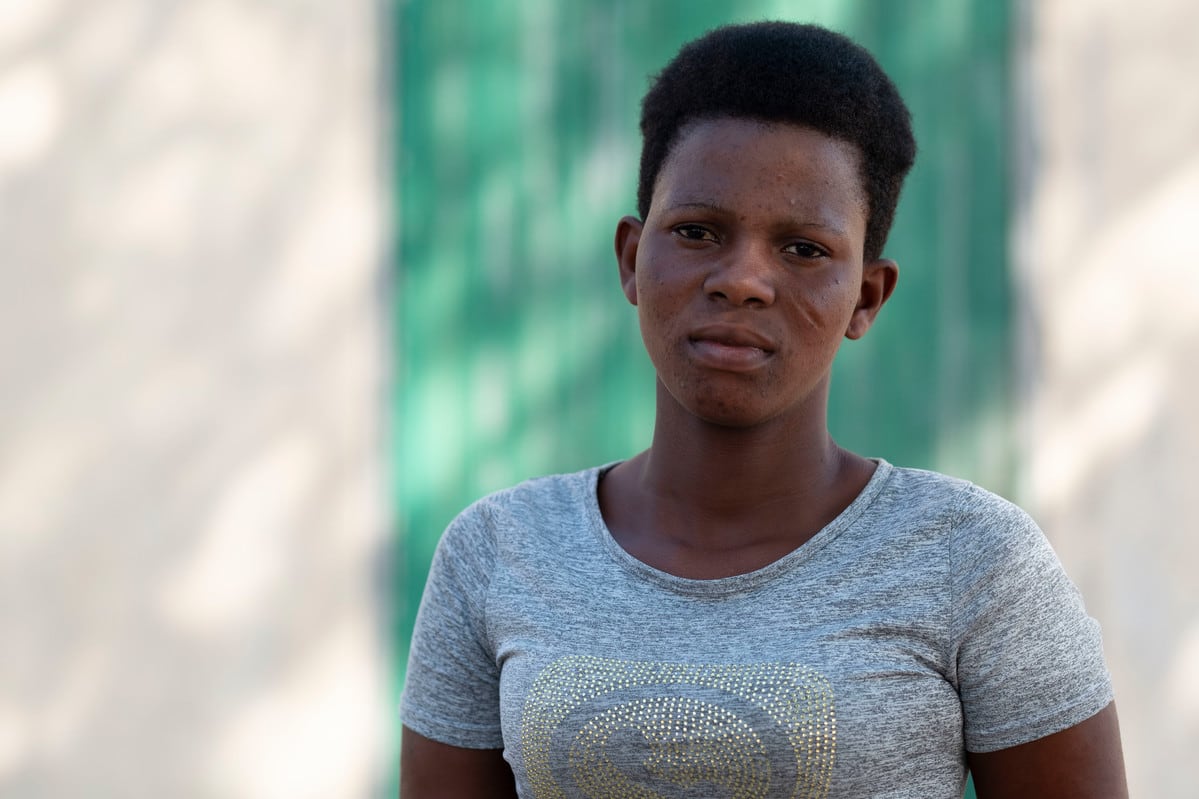
“I want to use it for a couple of years and then maybe we will think about having another child”
Every three months, Mawoula Dahide meets a community health worker in her village in central Togo to receive a single contraceptive injection and then carries on with her busy day. Dahide, 20, has a two-and-a-half year old son and a husband living in the capital and juggles an apprenticeship in tailoring with caring for her child. After recovering from the birth, Dahide tried the injection and immediately felt relief, knowing she would decide when she got pregnant again. “I want to use it for a couple of years and then maybe we will think about having another child,” she said. Lack of access Until 2013, Dahide and the other women living in the village of Ilama had no access to regular contraception at all, and its use was sometimes regarded with suspicion, and even fear. In her community, the average age of a mother’s first pregnancy is around 16, and women might bear a total of six or seven children compared to the national average of 4.7, according to local health workers. That trend is changing with a pioneering programme run by the Association Togolaise pour le Bien-Être Familial (ATBEF), which has trained community health workers to administer contraception in the rural areas where they live. ATBEF has focused their distribution of contraceptives within poor and rural communities, and with mobile outreach clinics that go to villages with no trained health workers. The unmet need for contraception in Togo stands at 34% of the population, and in rural communities, this is even higher. The association contributes a fifth of overall contraception cover to couples in Togo, a West Africa nation of 7.8 million people. There is a clear favourite among the methods offered, which include male and female condoms, the pill, and the contraceptive injection. “The injection is more used than any other method. Around 60% of women use it,” said Félicité Sonhaye, ATBEF Regional Coordinator for Togo’s Plateaux region, which covers Ilama. Women appreciate the reliability and long-lasting effects of the injection, Sonhaye added, which allow them to stop worrying about unexpected pregnancies. From client to advocate Dahide has become an advocate for the method among her peers within her community. “My friends are getting the injection as well. I was the first to start using it and it was great, so I told them about it,” she said. Another convert to the injection is Ilama’s village chief, Sossou Sagna. The father of seven agreed with his wife they didn’t want anymore children. “I sent my own wife to seek family planning. The lady helped us and it worked really well. I also went with my older brother’s wife and she was very satisfied,” Sagna noted in the cool of the shade. “My wife chose the three-month injection,” he added. Sagna had not anticipated some of the wider effects of increasing contraceptive use within the community, which have become prevalent over the last couple of years. “Every member of this community is now aware that having a large family drives them towards poverty,” he said. Families have more money to spend feeding and educating their children in an economy where the cost of living keeps rising. Villagers who see Sagna attending family planning sessions are also convinced that rumours about contraception making them ill are untrue. “Ignorance was the reason why we had so many children per family here before. Now with the family planning advice we have received, spacing births has become a reality and the reduction of the number of children per family,” he added. The gains of the ATBEF rural programme will now go even further with the imminent introduction of Sayana Press, a contraceptive injection that women can self-administer. Learn more about some of the most popular contraception methods available and if they are right for you Photography by Xaume Olleros for IPPF
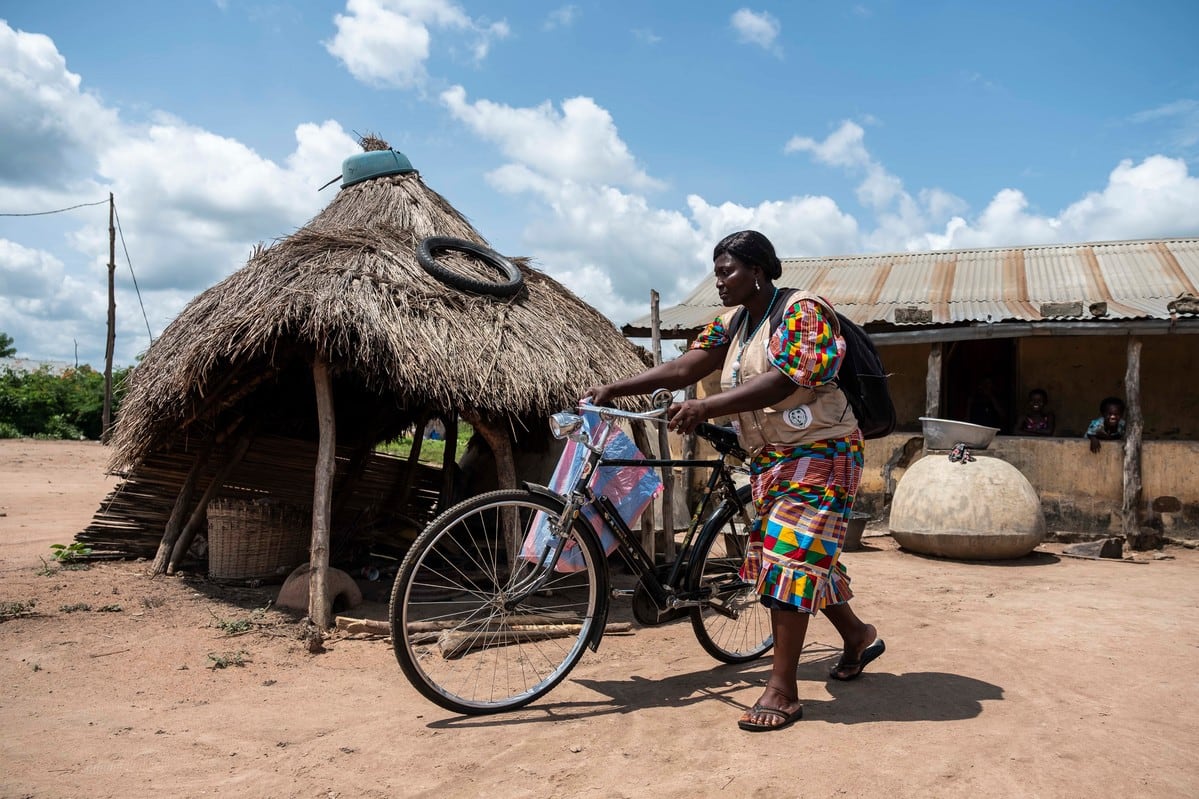
“Some of the young women can’t educate their own children because they had to drop out of school themselves”
Abla Abassa lives in the village of Ilama, population 2,000, in rural central Togo. After waking up early each morning to prepare for the day ahead, she sits down to map out her route. Abassa is a community health worker, and spends her days cycling around Ilama’s dusty streets to visit households who have signed up to an innovative programme that provides contraception in hard-to-reach places. The village is an hour by bumpy dirt track from the regional capital of Atakpamé, and few residents have the time or money to travel into town on a regular basis to refill prescriptions. For years, that meant the women of the community had just one form of protection against pregnancy: avoiding sex altogether. In 2013, Abassa became one of 279 community health workers in the Plateaux region funded by the Association Togolaise pour le Bien-Être Familial (ATBEF), working in two districts where the unmet need for contraception was greatest. Today, Abassa has three different clients, but can deal with as many as five a day. The health worker meets women on their own or with their husbands, and conversation flows about village life before she administers a contraceptive injection, or leaves behind a small pile of condoms. Reaching those in need She begins the day a few doors down at the home of Essivi Koutchona, a mother of six who has used the contraceptive injection for the last two-and-a-half years. “The community health worker passed by our house one day and explained the method and a bit about the possible side effects,” Koutchona said. “We agreed as a couple that we wanted me to start using the injection”. Koutchona’s husband, Konou Aboudou, credits Abassa and the ATBEF with improving his marriage, which he said was strained by the rhythm [calendar] method and supporting many young children at once. “Now we can better understand and support our wives. We avoid adultery and pregnancies are planned,” he explained. “Before, people didn’t have a lot of information about contraception. With the project we have undertaken with ATBEF since 2013, the community is now able to space their births,” Abassa said, adding the couple had told her they wished the programmed has started years ago. Togo currently has a fertility rate of 4.7 children per woman, according to the United Nations Statistics Division, but is trying to bring that number down. Battling misinformation The government faces entrenched attitudes about the value of a large family, and misinformation spread about contraception. A community health worker has two roles: safely providing contraception, but also reassuring women that many of the rumours they have heard that the injection or pill will make them sick are false. “I tell them that side effects come from the product, so if they have an irregular period it’s not because they are ill,” Abassa said, adding it had taken much persuasion over the last five years to reach the point where she was now trusted. Abassa’s next client preferred to meet at the health worker’s home for some privacy. At 45, Adjo Amagna is still having periods and wants to avoid any chance of another pregnancy. “I think I want to go for the injection. I have never used contraception before so I think I will do it for three months to see how it goes,” she said. After the death of her fifth child, the only baby she had with her second husband, Amagna wants to focus on caring of the four children she has left. She sat down with the health worker and was passed condoms, femidoms and the pill, while Abassa explained how the injection works. After a half hour chat, Amagna agreed to begin the injection on her next visit. Changes within the community On the way to see Mawoula Dahide, a 20-year-old with one child, her last client of the day, Abassa reflected on the changes she has seen in the community since her job began. “I have seen the number of children per family going down,” she said. “That’s contraception but also the increasing cost of living, and the fact that these days everyone wants to send their children to school.” The prevalence of contraceptive use was at 17% before the programme began, but with the focus on rural communities this has risen to 23% nationwide, even though not all areas of Togo are covered by dedicated health workers yet. We met Dahide in a quiet corner as she took a short break from an apprenticeship in tailoring. “It’s pretty tough balancing my son and my apprenticeship. If I had waited to have a kid before starting it would have been a lot easier,” she admitted. “My husband is studying at the university in Lomé so I only see him during the holidays and maybe a few weekends during term time.” Younger women like Dahide are sometimes harder to reach, said Abassa, and have a greater unmet need for contraception in a community where many have their first child around the age of 16. “Some of the young women can’t educate their own children because they had to drop out of school themselves,” the health worker explained, adding her focus was always on recruiting more teenagers to her cause. As she heads home for the day, Abassa waved to clients and neighbours, while wondering who might be on her doorstep looking for advice when she gets there. Photography by Xaume Olleros for IPPF
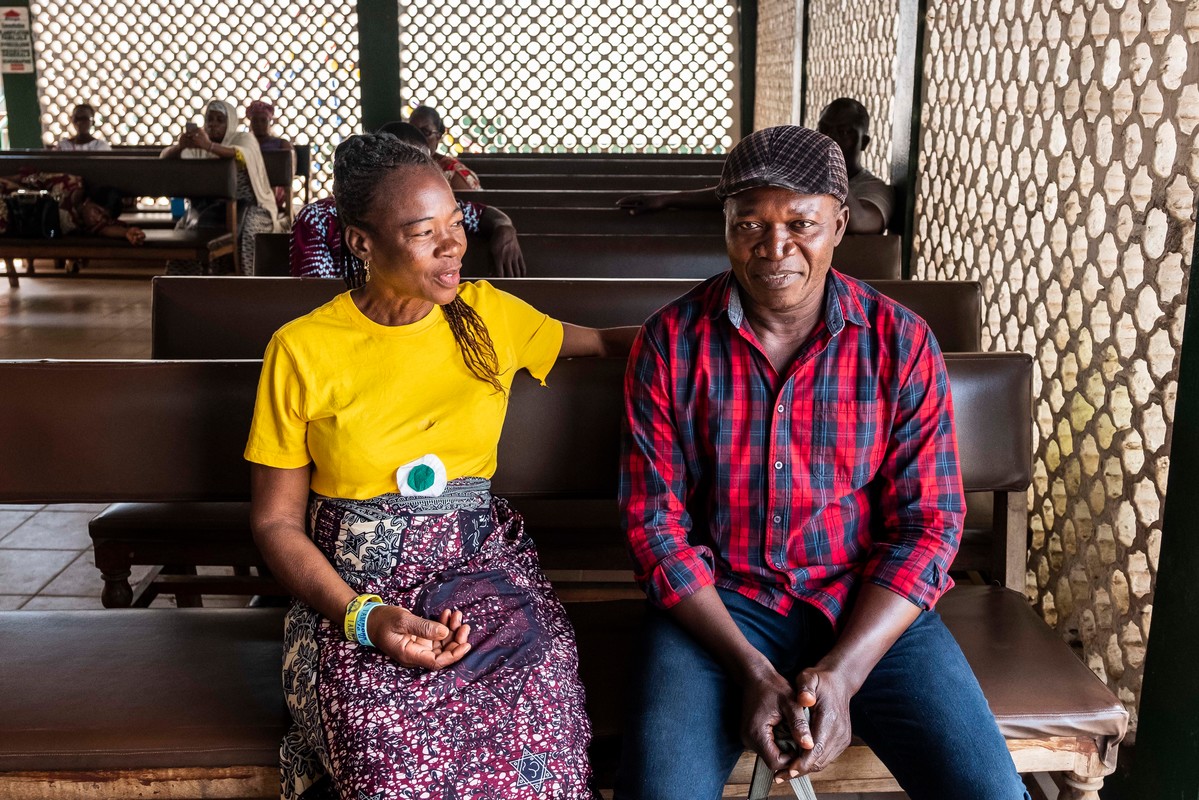
A rise in men seeking vasectomies in Togo despite cultural taboos
Yaori Ajossou was listening to the radio with his wife in Togo’s capital, Lomé, when the usual chatter turned to a topic he’d never considered: vasectomy. It was 2015 and Ajossou, then 53 years old, was on the point of retiring from his career in the military. He had idly wondered about having another baby – a seventh child – but after the programme, thoughts of his 42-year-old wife’s health problems started churning in his head. Making the decision “I said to her, why don’t we go and get some information?”, Ajossou recalled. The couple visited the Association Togolaise pour le Bien-Etre Familial (ATBEF) and asked the staff several questions: Would it hurt? Could they still have sex afterwards? Was it 100% effective? Yaori’s wife, Ami, had always taken the lead on contraception, but her fragile state of health was being exacerbated by side effects, and she was not ready to become a mother again. “I was taking the pill but it tired me out and I stopped taking it until I got pregnant again,” she sighed. “Then I took the implant, but it wasn't good for my heart. I had to take it out.” Ajossou opted for a vasectomy procedure soon afterwards. Men & family planning Radio campaigns are the primary way in which men in Togo hear about vasectomy in the local Mina language, and potential candidates have come trickling in following information campaigns by ATBEF – along with some of their wives and girlfriends. Sylvain Bingo M’Bortche, Chief of ATBEF’s Medical Division, said he was surprised by the number of candidates in a country where masculinity is prized, and large families remain a mark of pride and virility. “We thought men would not accept it but we quickly realised that there was an unmet need,” he said. “Men even come here from other countries, such as Benin, to benefit from vasectomies.” M’Bortche says the strategy is now to decentralize care to more rural areas of Togo, where access to healthcare is scarce and the lack family planning much worse. “We've trained service providers to provide this in the interior of the country, in Atakpamé and Kara,” he said. “Men aren’t implicated in family planning in these communities.” A shift in attitudes Today in Togo, 870 villages have signed up to plans incorporating sexual and reproductive health strategies, with outreach provided via community health workers and mobile clinics. Sometimes men want to keep having children for cultural reasons related to the higher status of boys, and end up with far more than initially planned. “I wanted three sons. But the first was a girl. The second was a girl. The third was a girl,” said Komlau Anaglavi, a 57-year-old Lomé native who owns a rock crushing company. Five daughters later, Anaglavi said he was ready to give up trying, saddled with the costs of feeding and educating his girls in an economy under pressure. “The cost of living today is really high. And if you want your child to succeed in their studies… you have to have money if you want them to go to good schools,” he said. His wife heard about ABTEF’s vasectomies and collected some information on her own, before asking her husband if he would consider it. After much talking, Anaglavi agreed, and since the procedure three years ago, he has become something of an evangelist. “Now I'm an advocate for it. I tell other people that they should get it done,” he said, adding he told them: “Sometimes you want to have sex and you don't have a condom nearby. The vasectomy is really clear and safe. It's not expensive”. He also stops misinformation spreading by pointing to his own experience, and has informed several men it is untrue that you can no longer have sex after a vasectomy. A generation for change A younger generation of men are now considering vasectomy earlier in life, reflecting trends in the city towards having a smaller number of children. Edem Badagbo’s wife died giving birth to their third child, but Badagbo, 33, said he is going ahead with the procedure to keep a promise they had already made together. “I came by to ask for information and they gave me a lot of it. I had decided to do it but unfortunately during the reflection period my wife then died, just a month ago,” he said. Left alone with three young children, Badagbo is now focused on giving them the best upbringing possible. “Better to have fewer children and be able to properly support them at school,” he added, wiping away tears. Photography by Xaume Olleros for IPPF
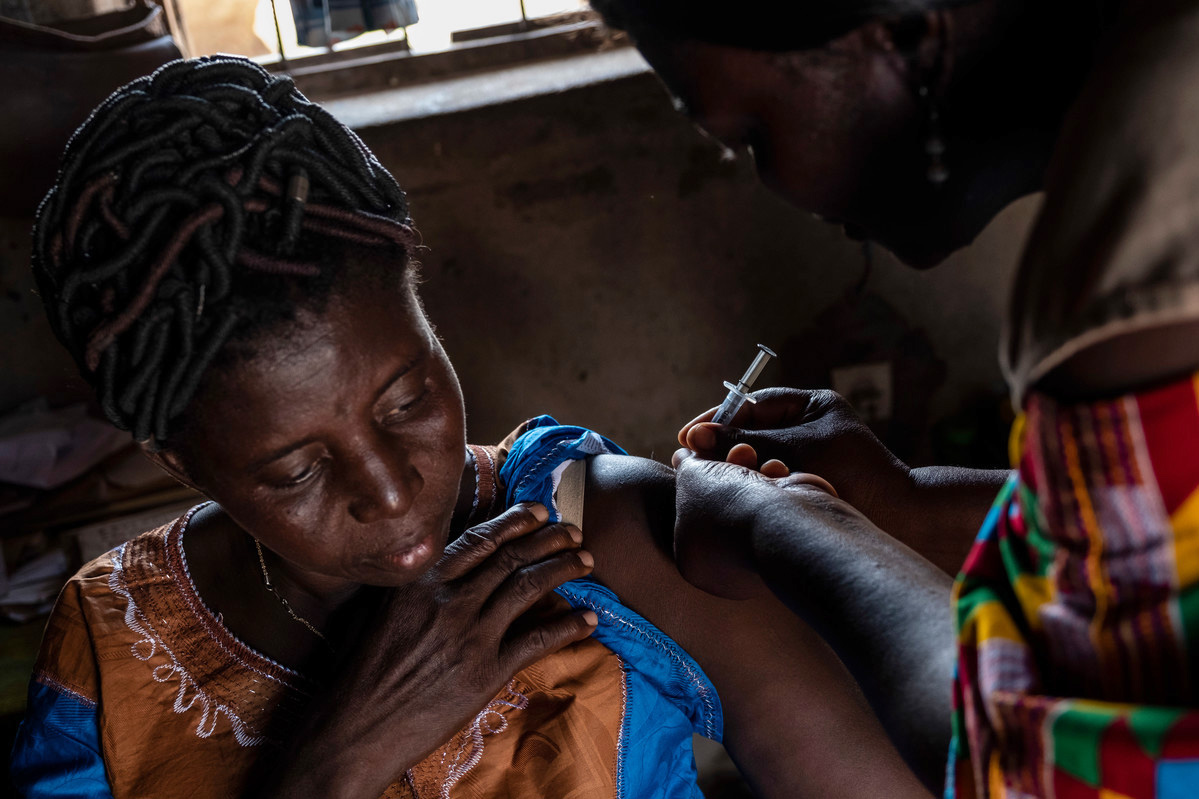
Togo: A country where contraception use is on the rise
Seated in an open-air classroom in the Togolese village of Tohoun, Adjo listens intently as her teacher leads a discussion about sexual harassment. At 13, Adjo is already aware of the dangers of teenage pregnancy and early marriage in her community and is learning how to handle boys trying to get her attention. “The boys really like chasing the girls and if you don’t know about that then you can get pregnant,” she said. “I want to finish my studies and have a boyfriend later.” Adjo is one of 410,000 young people who receive comprehensive sexuality education in schools and youth clubs in Togo, a country making huge strides in sexual healthcare provision. Youth & sex education Targeting youth in schools like Adjo’s is also a key focus. Young people have access to dedicated services at clinics in the country’s four regions, as well as outreach programmes for education and sexual healthcare, including HIV and STI testing in villages. “Last year there were about 15 girls pregnant, but since the ATBEF youth club started that has gone down a lot,” says 13-year-old Adjo. In Togo, 17% of young women will give birth before the age of 18. Through the Association Togolaise de Bien-Etre Familial (ATBEF), Togo now promotes the use of village charters to encourage the protection of girls from unintended pregnancy and gender-based violence. The decision of 870 villages to sign up to protection charters aimed at protecting girls and encouraging them to finish school has had a real impact. Men are taking an active role in the protection of women and young girls, and the delaying of pregnancy, through ATBEF’s village chief programme. “There have been problems with early pregnancy, but ATBEF encourages us to talk with young people, and to encourage them to use condoms,” explained Komi Agnimavo Amazoun, village chief of Detokpo, in central Togo. He intervened to stop a girl being forced to marry her rapist, a previously common practice in the area. “We have started to raise awareness in the village so that similar cases won’t be repeated,” Amazoun added. A rise in contraception use Togo, a nation of 7 million, has a fertility rate of 4.7 children per woman, according to the United Nations Statistics Division, but is aiming to cut it further. Since 2013, ATBEF more than 800 community health workers have been trained to advise and administer contraception nationally. ATBEF uses mobile clinics to reach rural areas and runs a successful clinic offering local men the option of non-surgical vasectomy - a rarity in the region. Based in the communities where they work, the health workers go door-to-door explaining the benefits of different contraceptive methods in local languages, building long-term trust. In the coming months, women will be able to administer contraceptive injections themselves in these communities, thanks to the introduction of the Sayana Press method. The prevalence of contraceptive use was at 17% before the community health worker programme began, a figure which has risen to 23% nationwide, according to government figures. “It’s no longer a taboo subject as it was in the 1980s, 1990s or 2000s,” explained Félicité Sonhaye, ATBEF Regional Coordinator for the central Plateaux region. “Today all women know about contraception, even if they don’t use it.” An increase in vasectomies Men in Togo are also increasingly considering long-term solutions to limit the number of children they support, especially while the country suffers an economic downturn. ATBEF is the only organization offering vasectomies in Togo and to date, 159 men have undergone keyhole vasectomy, despite strong cultural taboos surrounding men’s virility. “We thought men would not accept it but we quickly realized that there was an unmet need,” noted Sylvain Bingo M’Bortche, Chief of ATBEF’s Medical Division. “We have potential clients coming in and out [of Togo]. Men even come here from other countries, such as Benin, to benefit from vasectomies,” he added. Photography by Xaume Olleros for IPPF







